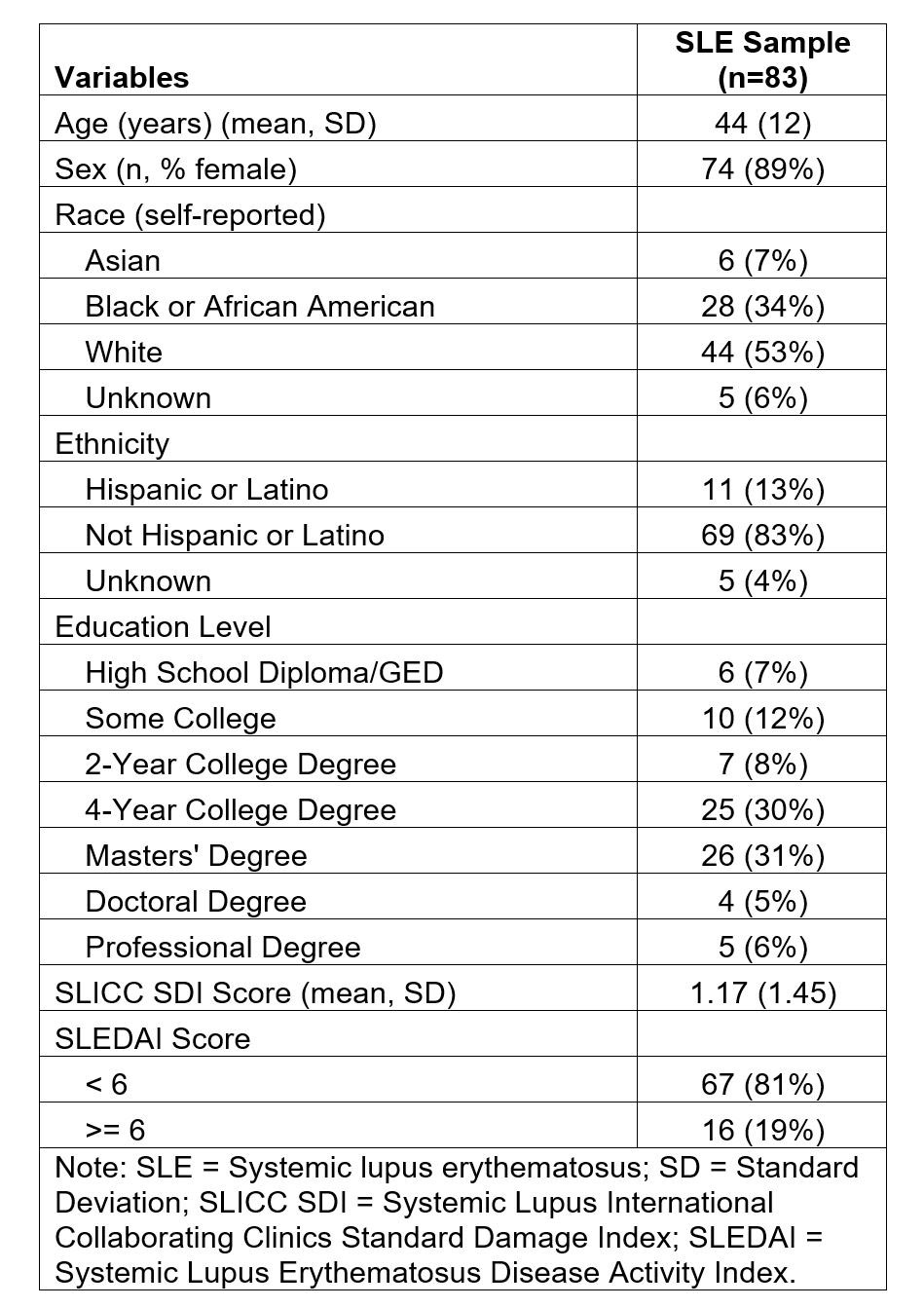Session Information
Session Type: Poster Session B
Session Time: 9:00AM-10:30AM
Background/Purpose: Evidence suggests that physical activity is a modifiable lifestyle behavior that helps manage the manifestations of systemic lupus erythematosus (SLE). However, persons with SLE are often physically inactive. There is a need to identify variables grounded in a well-developed theory associated with physical activity in persons with SLE, to identify correlates, targets, and behavior change strategies. This study examines the social cognitive theory (SCT) correlates of physical activity in persons with SLE.
Methods: The Lupus Intervention Fatigue Trial (LIFT) is a Phase II ongoing study designed to mitigate fatigue by increasing physical activity. Data for the analysis presented here are from LIFT’s baseline visit. All participants satisfied American College of Rheumatology or Systemic Lupus International Collaborating Clinics classification criteria for SLE. Participants completed questionnaires to assess physical activity and SCT variables: exercise self-efficacy (EXSE), outcome expectations, exercise goal-setting (EGS), and physical function. Participants wore an ActiGraph GT3X accelerometer for 7 days, and Troiano cutpoints were used for moderate-to-vigorous physical activity (MVPA). Estimated associations between MVPA, Godin Leisure-Time Exercise Questionnaire Health Contribution Score (GLTEQ HCS), and SCT variables were derived using Spearman correlations (r). For regression analyses, we conducted univariate analyses to identify SCT variables for inclusion in multiple regression models of each outcome (selection criterion: p ≤0.2). We then used multivariable regression models to examine associations between selected SCT variables and physical activity outcomes: 1) due to skewness of MVPA, we used log(base10) transformed weekly MVPA minutes in the regression models; 2) logistic regression models were used for analysis of the Sufficiently Active outcome, defined as GLTEQ HCS ≥ 24.
Results: Participant characteristics (n=83) are summarized in Table 1. The median (Interquartile Range) for average daily accelerometer-measured MVPA was 14 (6, 28) (Table 2). According to the self-reported GLTEQ HCS, 28% of participants were classified as Sufficiently Active, 15% Moderately Active, and 57% Insufficiently Active/Sedentary. MVPA was significantly correlated with EXSE (r =0.22), EGS (r =0.34) and physical function (r =0.35). GLTEQ HCS was significantly correlated with EXSE (r =0.45), EGS (r =0.51), and physical function (r =0.32)(Table 3). Outcome expectations were not significantly correlated with either accelerometer-measured MVPA or GLTEQ HCS. Adjusting for race and age had limited influence on associations between physical activity and SCT variables. In multivariable models, levels of accelerometer-measured MVPA were positively associated with EGS (p< 0.01) and physical function (p< 0.001). Being classified as Sufficiently Active was positively associated with EGS (p< 0.01).
Conclusion: These results suggest that researchers may consider applying intervention strategies that address exercise goal setting and self-perceived levels of physical function for improving MVPA participation among persons with SLE.
To cite this abstract in AMA style:
Kinnett-Hopkins D, Song J, Chmiel J, Bussell L, Young A, Chung A, Erickson D, Milaeger H, Ramsey-Goldman R, Ehrlich-Jones L. Social Cognitive Correlates of Accelerometer-measured and Self-reported Physical Activity in Persons with Systemic Lupus Erythematosus [abstract]. Arthritis Rheumatol. 2022; 74 (suppl 9). https://acrabstracts.org/abstract/social-cognitive-correlates-of-accelerometer-measured-and-self-reported-physical-activity-in-persons-with-systemic-lupus-erythematosus/. Accessed .« Back to ACR Convergence 2022
ACR Meeting Abstracts - https://acrabstracts.org/abstract/social-cognitive-correlates-of-accelerometer-measured-and-self-reported-physical-activity-in-persons-with-systemic-lupus-erythematosus/



